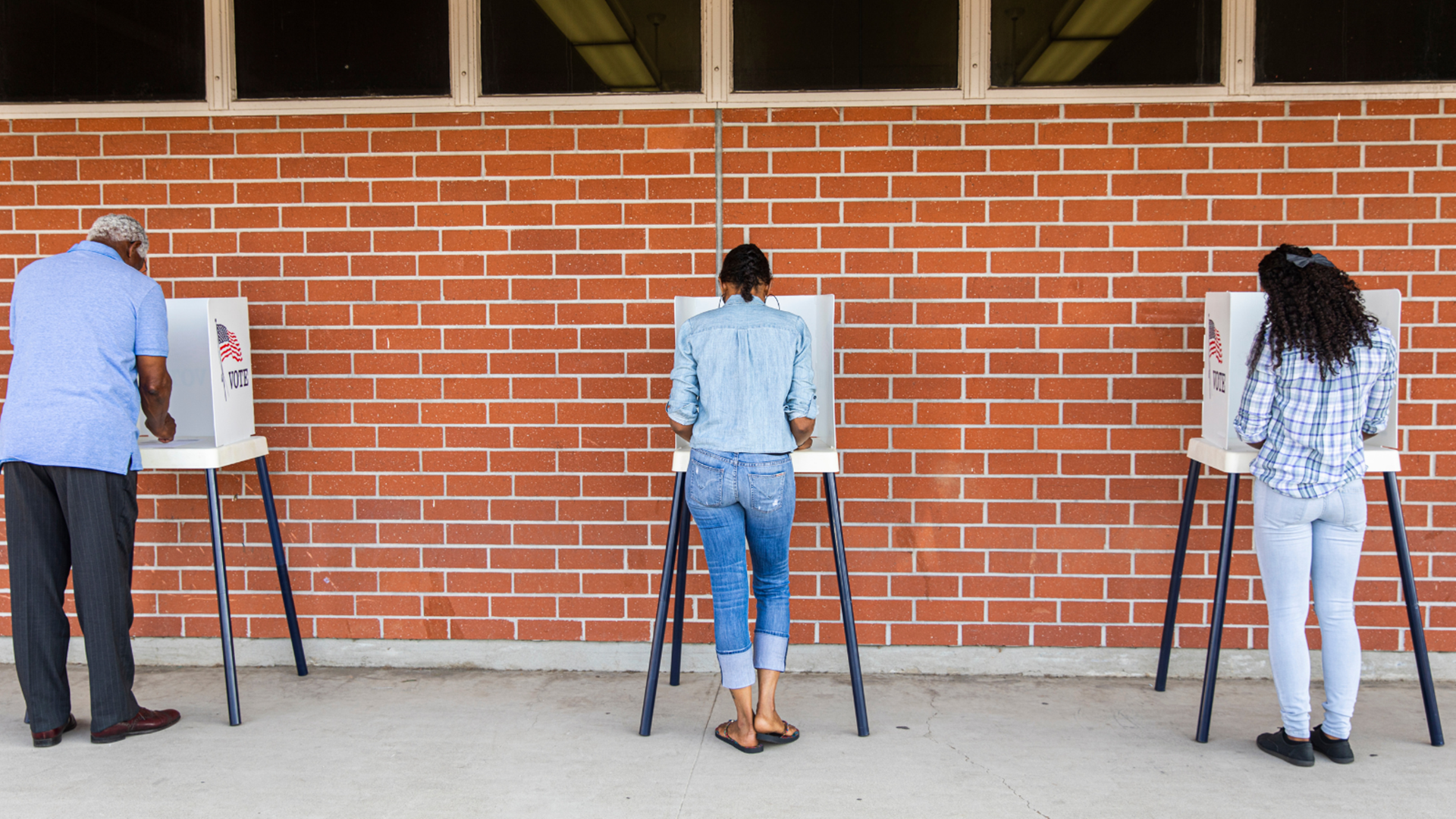What is voter intimidation and how do I report it in Ohio and Michigan?
If a person is found guilty of violating federal voter intimidation laws, he or she faces federal charges and up to a year in prison and up to $1,000 in fines.

You as a voter are protected from being intimidated when you go to the polls by both federal and state laws.
According to federal laws, "no person … shall intimidate, threaten, coerce ... any other person for the purpose of interfering with the right of [that] person to vote or to vote as he may choose."
If a person is found guilty of violating federal voter intimidation laws, he or she faces federal charges and up to a year in prison and up to $1,000 in fines.
What is Voter Intimidation? What is Voter Intimidation?
Many states have their own laws prohibiting voter intimidation, which is described as the use of threats, coercion, or attempts to intimidate for the purpose of interfering with the right of another person to vote or to vote for the person of their choosing.
Some examples of voter intimidation:
- Physically blocking polling places
- Using threatening language in or near a polling place
- Yelling at people or calling people names while they are in line to vote
- Disrupting or interrogating voters
- Looking over people's shoulders while they are voting
- Aggressively questioning voters about their citizenship, criminal record, or other qualifications to vote.
- Falsely representing oneself as an elections official.
- Displaying false or misleading signs about voter fraud and related criminal penalties.
- Other forms of harassment, particularly harassment targeting non-English speakers and voters of color.
- Spreading false information about voter requirements.
- You do not need to speak English to vote, in any state.
- You do not need to pass a test to vote, in any state.
- Some states do not require voters to present photo identification.
What Are Ohio and Michigan's Laws? What Are Ohio and MIchigan's Laws?


Both Ohio and Michigan have specific laws on the books that address election law crimes and outline punishments for people convicted of those crimes, including voter intimidation.
In Ohio, Attorney General Dave Yost said it's a first-degree felony if a person is convicted of:
- Loitering in or around a polling place during the casting and counting of ballots so as to hinder, delay, or interfere with the conduct of the election
- Attempting to intimidate an election officer, or preventing an election official from performing the official's duties
- Knowingly tearing down, removing, or destroying any of the registration lists or sample ballots furnished by the board of elections at the polling place
- Removing from the voting place the pencils, cards of instruction, supplies, or other methods furnished to enable the voter to mark the voter's ballot.
Yost on Oct. 13 issued a video message reminding voters that poll watching is a regulated activity in Ohio, meaning a person can't just camp out and observe activity without prior registration. No campaign activities can take place within 100 feet of a polling location (look for little American flags to mark the distance at most places).
“Hands off the polling places,” Yost. said. “Hands off the vote.”
Poll workers in Ohio are receiving de-escalation training. The Ohio Secretary of State’s Office created a de-escalation training video that will be part of a four-part online training module that also includes the following topics: PPE and Safety procedures, Monday early setup and reverting to paper signature poll books.
Wood County Board of Elections Director Terry Burton said poll worker recruitment and education is ongoing.
"We want to get in as many names as we can, and so we're continuing to not only recruit (poll workers) but also accept names and get them part of our in-person training. ... We're going over a lot more in the class and the in-person class just so they understand that it takes two to have a fight," he said.
In Michigan, it is a felony offense to attempt, either directly or indirectly, to influence a voter in giving his or her vote, or to deter the voter from voting or to interrupt the voter from giving his or her vote at any election held in the state.
On Oct. 16, Michigan Secretary of State Jocelyn Benson also issued direction to local clerks statewide clarifying that the open carry of firearms on Election Day in polling places, clerk’s offices, and absent voter counting boards is prohibited.
“Fair, free and secure elections are the foundation of our democracy,” said Benson. “I am committed to ensuring all eligible Michigan citizens can freely exercise their fundamental right to vote without fear of threats, intimidation or harassment. Prohibiting the open-carry of firearms in areas where citizens cast their ballots is necessary to ensure every voter is protected.”
What Can I Do? What Can I Do If Intimidated?


We will be on the lookout for any problems that prevent people from voting — such as mail ballot delivery problems, changed voting locations, long lines, registration problems, purged voter rolls, broken machines and voter intimidation.
WTOL 11 is also embarking on a unique partnership this election season. ProPublica is a nonprofit investigative news organization, and we're teaming up with them to cover elections. WTOL 11 is a partner in ProPublica's Electionland project, a nationwide media collaboration to track voting problems and election integrity. You can help us - tell us if you experienced or witnessed any problems when casting your ballot.
To let us know how your voting experience goes, here are the many ways to get in touch.
- Text WTOL 11 directly at 419-248-1100
SMS: Text the word VOTE, VOTA (for Spanish) or 投票 (for Chinese) to 81380 (standard text message rates apply).
WhatsApp: Send the word VOTE, VOTA (for Spanish) or 投票 (for Chinese) to 1-850-909-8683.
Facebook Messenger: Go to m.me/electionland.
Complete this form to share your election experience with us so ProPublica and our partners can investigate.
If you or someone else is being threatened at the polls, alert a poll worker on site. Be clear about the intimidation tactic you observed. Talk to the election supervisor or call your state Board of Elections to report the activity.
In Ohio, the Elections Division of the Ohio Secretary of State's Office can be reached at the following numbers:
614-466-2585
877-SOS-OHIO (877-767-6446 x1)
TTY: 614-728-3295
TTY Toll-free: 877-TTY-OHIO (877.889.6446)
You can also fill out a form online by clicking here.
In Michigan, you can contact the Michigan Bureau of Elections at 517-335-3234 or by emailing elections@michigan.gov
You can also report it to the Election Protection Hotline at 1-866-OUR-VOTE or the US Department of Justice voting rights hotline at 1-800-253-3931.
The Election Protection Hotline is a nonpartisan coalition of 100 local, state and national partners that works to ensure voter rights about an incident.
If you are a Spanish speaker, you may also call 1-888-VE-Y-VOTA (en Español).
If you think your voting rights were violated - or the rights of a specific group of people - you also can speak to a civil rights lawyer in your area.
RELATED: Here’s how to spot voter suppression and what to do if you are targeted during the 2020 election


